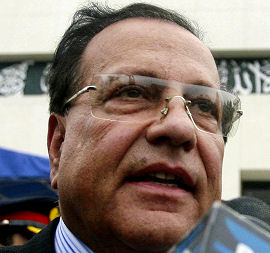Governor of Pakistan’s Punjab province assassinated
The governor of Pakistan’s Punjab province has been assassinated. It is claimed Salman Taseer was killed by one of his guards because of his opposition to Pakistan’s controversial blasphemy law.
Rights groups say the law is often exploited by religious extremists as well as ordinary Pakistanis to settle personal scores.
Islamist groups have been angry over what they believe were government plans to change or scrap the law.
The assassination of Salman Taseer comes as Pakistan‘s Prime Minister Yusuf Raza Gilani tried to muster support for the government after a main coalition partner quit over government fuel price policies.
The governor fell down and the man who fired at him threw down his gun and raised both hands. Ali Imran, witness
A witness at the scene said Taseer was stepping out of his car at a shopping area when he was shot.
“The governor fell down and the man who fired at him threw down his gun and raised both hands,” said the witness, Ali Imran.
The shooting left blood stains on a parking area on the edge of the Kohsar shopping centre, which is popular among foreigners in Islamabad.
Blasphemy law
The blasphemy law came under the spotlight after a court sentenced a Christian mother of four, Asia Bibi, to death in a case stemming from a village dispute.

The law enjoys widespread support in Pakistan, which is more than 95 per cent Muslim, and most politicians are loath to be seen as soft on the defence of Islam.
But Taseer had visited Bibi in prison in a campaign for her release.
Jon Snow blogs: Too late to put the radical genie back in the bottle?
Taseer wrote on his Twitter page last Friday: “I was under huge pressure sure 2 cow down b4 rightist pressure on blasphemy. Refused. Even if I’m the last man standing.”
Interior Minister Rehman Malik said the slain politician’s guard, identified as Malik Mumtaz Hussain Qadri, confessed and had been arrested but investigations would determine if others were involved.
“Salman Taseer is a blasphemer and this is the punishment for a blasphemer,” Qadri said in comments broadcast on Dunya television.
Political implications
Taseer, a liberal and charismatic politician close to President Asif Ali Zardari, had no role in day-to-day central government but his killing will compound a sense of crisis.
Earlier, the main opposition the Pakistan Muslim League (PML-N), led by former Prime Minister Nawaz Sharif, said it would not demand a vote of no confidence in Gilani because to do so would exacerbate instability in the South Asian nation.
That offered a reprieve but left the coalition weak.
Sharif told a news conference he would present the government with demands such as a rollback of fuel price rises and the sacking of Ministers accused of corruption, and gave the government three days to agree.
He threatened to evict members of the ruling Pakistan People’s Pary (PPP) out of the Punjab provincial government, which his party dominates. Sharif suggested there may be a need for new national elections, but did not say when.